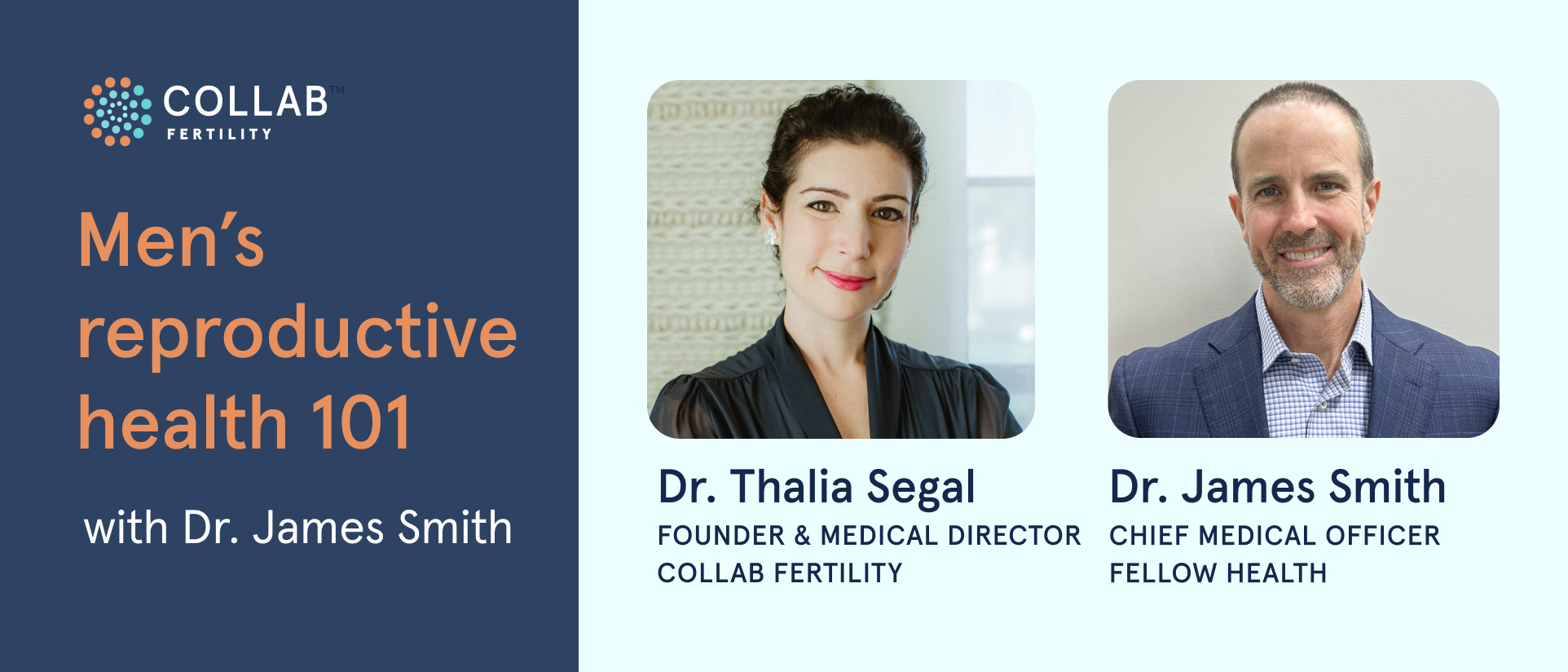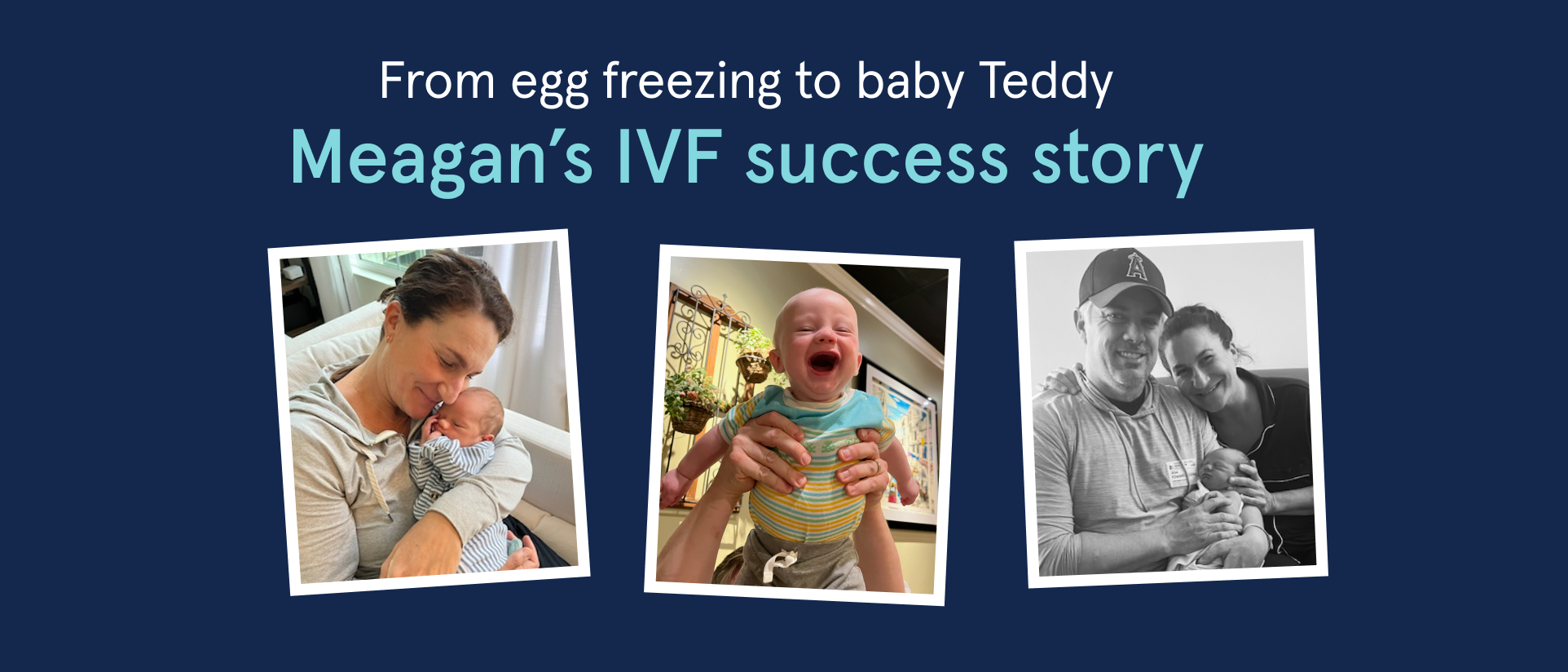
How is male fertility tested? Your guide to male fertility with leading Bay Area urologist, Dr. Shu Pan
When couples face fertility challenges, male factor infertility is a critical, but often underexplored, piece of the puzzle. In fact, male fertility plays a role in nearly half of all cases of infertility.
At Collab Fertility, we take a whole-person, inclusive approach to reproductive care, supporting both partners from the very beginning through our innovative care model, The Collab Way. We partner with top male fertility specialists, such as Dr. Shu Pan, a board-certified urologist and male infertility specialist who brings deep expertise in male reproductive health to our extended care team.
In this Q&A, Dr. Shu Pan shares answers to common questions about how male fertility is assessed, what factors affect sperm quality, and when to consider advanced testing or treatment. If you’re looking for a male fertility test or a fertility clinic in the Bay Area that supports both male and female reproductive health, this is a great place to start.
Q: How do you test for male fertility?
Dr. Shu Pan:
“Fertility testing starts the moment I meet the patient. I take a comprehensive medical and social history because what people do in their everyday lives, from alcohol to smoking to recreational drugs, has a direct impact on fertility.”
“In terms of specific testing, the first step is usually a semen analysis. However, I don’t send that to just any lab. I use trusted fertility clinics with in-house andrology labs, such as Collab Fertility. A good semen analysis looks at concentration, motility, and morphology. I also order bloodwork to check hormone levels and, if needed, we’ll do genetic testing like a karyotype or Y-chromosome microdeletion panel.”
“But I always tell patients: an abnormal semen analysis does not mean you can’t father a child. The World Health Organization created thresholds using healthy men who had fathered children, and they defined abnormal as being below the 5th percentile. That doesn’t mean you’re infertile. It just means you’re below average in one parameter.”
Q: How do you increase male fertility? If a man’s fertility test results aren’t ideal, what can he do to improve them?
Dr. Shu Pan:
“I always start with the highest-yield lifestyle changes. Quit smoking, reduce alcohol and marijuana, get your weight under control, and manage any underlying conditions like diabetes. I also look for correctable issues like a varicocele, a dilation of the veins in the scrotum that can impair sperm production.”
“For patients going through IVF, lab techniques like microfluidic sperm sorting or density gradient sperm preparation can help. And in some cases, we’ll consider retrieving sperm directly from the testicle to bypass DNA damage that occurs as it travels through the reproductive tract.”
How can a man tell if he’s fertile or not?
Dr. Shu Pan:
“Semen analysis is the starting point, but fertility is nuanced. Some men with abnormal results can still conceive, and others with normal results may struggle. A full workup with a fertility doctor is the best way to understand what’s going on.”
At what age are men most fertile?
Dr. Shu Pan:
“I’d say men are probably most fertile in their twenties, after full maturation. However, the decline in male fertility is a much gentler slope compared to that of women. While women face a sharp drop around age 36 or 37, men experience a more gradual decrease. That said, advanced paternal age, usually defined as 40 and up, can affect semen parameters.”
When is a man's sperm most potent?
Dr. Shu Pan:
“That’s kind of an urban legend. You’re not a revolver, you’re more like a Gatling gun. Your body is constantly producing sperm. Sure, if you ejaculate back-to-back, the second sample might have a lower concentration, but generally, there’s no perfect moment.”
“During your partner’s fertile window, having sex daily or every other day is fine. Sperm can survive in the vaginal canal for several days, so timing doesn’t need to be perfect. What really matters is overall health: regular aerobic exercise, avoiding toxins, and maintaining a balanced lifestyle.”
What is sperm DNA fragmentation? How is sperm DNA fragmentation testing done?
Dr. Shu Pan:
“Think of sperm like a tiny torpedo carrying a thumb drive of your DNA. If that DNA is damaged or fragmented, it can affect fertility, even when semen analysis looks normal.”
“There are several types of fragmentation tests. The one I use most often is the SCSA (Sperm Chromatin Structure Assay). It uses a fluorescent dye that binds to damaged DNA.”
“These tests aren’t part of the standard first-line evaluation, but I recommend them in cases of recurrent miscarriage, unexplained infertility, or when there’s known exposure to environmental toxins, like working in agriculture or industrial settings.”
Q: What happens if DNA fragmentation is high? Can it be treated?
Dr. Shu Pan:
“We start by optimizing lifestyle—quitting smoking, avoiding alcohol, reducing stress. We also consider advanced lab techniques to select better sperm. If needed, we can retrieve sperm directly from the testicle. Testicular sperm may have lower fragmentation since it hasn’t been exposed to oxidative stress in the lower urinary tract.”
“This approach has recently made it into the guidelines, and it’s something I coordinate closely with Dr. Segal and the team at Collab. We often time a fresh IVF cycle around this procedure to minimize damage from freezing and maximize the chances of success.”
Conclusion
At Collab Fertility, we believe that fertility care should be proactive, personalized, and inclusive of all aspects of reproductive health, including male fertility. If you’ve been trying to conceive without success, or if you’re simply curious about your reproductive health, we’re here to help.
Through our partnerships with specialists like Dr. Shu Pan and our in-house team of fertility experts, we provide access to comprehensive male fertility testing, personalized lifestyle support, and evidence-based treatments, all delivered with compassion and clarity.
As part of The Collab Way, our integrative approach supports both body and mind, providing every patient with individualized care that includes home toxin evaluation, wellness resources, and trusted referrals from day one.
Whether you’re looking to understand your sperm health, pursue IVF or IUI, or simply get answers, Collab Fertility offers expert guidance and comprehensive support throughout your journey.
Schedule a consultation today to learn more about male fertility testing near you at our Walnut Creek lab, serving patients from Bay Area communities including San Francisco, Berkeley, Danville, and more.

About Dr. Shu Pan
Dr. Shu Pan is a board-certified urologist dedicated to providing his patients with the highest quality of care through an empathetic, patient-centered approach. He also places added emphasis on maintaining and improving quality of life in the setting of urologic illness.
A Bay Area native, Dr. Pan completed his higher education in the state of New York. After earning his undergraduate degree in biomedical engineering from Columbia University, he obtained his medical degree from the State University of New York, Stony Brook. He then completed his urology residency at Yale New-Haven Hospital, which was followed by a fellowship in sexual medicine and male infertility at Boston Medical Center.
Throughout his training, Dr. Pan actively participated in clinical research focusing on prosthetic surgery, infertility, stone disease, and genitourinary cancers. His efforts resulted in multiple publications in peer-reviewed journals. Dr. Pan’s clinical interests include sexual dysfunction, hypogonadism, male factor infertility, as well as general urology. He has extensive experience in penile prosthetic surgery, microsurgical reconstruction (vasectomy reversal), in addition to minimally invasive general urologic procedures.
In his spare time, Dr. Pan enjoys playing frisbee golf and real-time strategy games. He is also working towards visiting every national park in the United States.
________________________
Proudly Supporting Local Communities
Collab Fertility is honored to serve families in the East Bay like Danville, Alamo, Orinda, Lafayette, Moraga, Piedmont, and Walnut Creek, as well as many other communities in the Bay Area and beyond, including Oakland, San Ramon, Concord, Pleasant Hill, Santa Rosa, Novato, Napa, Sonoma, and more.
Latest Articles

Men’s reproductive health 101: Dr. James Smith answers common questions about male fertility


